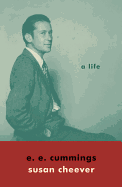
Susan Cheever (Home Before Dark) likes the poet Edward Estlin Cummings, aka e.e. cummings, very much. He and her father, John Cheever, were friends, so she was able to see Cummings read and experienced his poems and his exuberant and eccentric presentation style firsthand. Cheever considers him one of the "great and most important American poets," our "only true modernist." His reputation has fluctuated; when he died in 1962 it was on the rise, then it fell. Today, Cheever says, he's "too popular for the academy," yet at times "too sassy" for high school.
Cummings was born into wealth and an idyllic and privileged family. They lived close to Harvard, where his father, a strict minister, was a professor and he himself would eventually enroll. At college, with T.S. Eliot and John Dos Passos as classmates, Cummings became a rebellious, angry, brilliant young man. In his last year, he took an intensive class in poetic forms and formalism. Ironically, it gave him the freedom to experiment, freeing him to "string words and forms together in an electrifying and entirely original way."
Cheever doesn't shirk from examining Cummings's darker side--bouts with anti-Semitism, his reactionary conservatism, egotism and his life-long substance abuse--but always keeps his profound influence on poetry and young poets in mind. She quotes from his exuberant poetry throughout, and takes the time to discuss in depth a number of pieces. E.E. Cummings: A Life isn't the first biography of the poet, but it may be the most charming and heartfelt--a thoroughly enjoyable appreciation. --Tom Lavoie, former publisher

